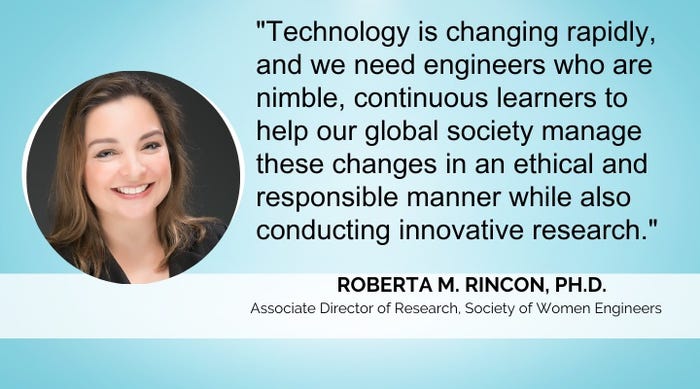Exploring the Job Market for Mechanical Engineers
Job opportunities are booming for mechanical engineers. Here are the skills needed to succeed.
May 19, 2023

Traditionally, mechanical engineers are responsible for researching, designing, developing, testing, and improving new and existing products, machines, and tools. However, according to research by ASME and Autodesk, mechanical engineering skills are expanding beyond their traditional scope. As a result, engineers will play crucial roles in developing better, sustainable, and more-efficient products with intelligent product iterations that create new business models. This expansion will include designing with electronics and for product modularity to extend product lifecycles.
Are Mechanical Engineers in Demand?
Excitingly, this evolution in mechanical engineering is creating a high demand for trained workers. Roberta M. Rincon, Ph.D., associate director of research at the Society of Women Engineers (SWE), advises that now is an excellent time to look for a job in this field, as the number of openings far exceeds the number of trained workers available to meet demand.
She cites the recent passage of the Bipartisan Infrastructure Law that increases investment in transportation and green technologies. “Civil engineers, environmental engineers, industrial engineers – new graduates and experienced professionals are needed if the U.S. is to meet the goals set under the current administration," said Rincon. “Technology is changing rapidly, and we need engineers who are nimble, continuous learners to help our global society manage these changes in an ethical and responsible manner while also conducting innovative research.”
What Skills Do Mechanical Engineers Need?
Rincon said that communication is the one skill hiring managers wish more engineers developed.
“I have heard numerous times that a manager will select an engineer with strong communication skills and so-so technical experience over a strong technical engineer with poor communication skills,” said Rincon.
The reason being that technical skills can often be learned on the job, while communication skills are essential for effective collaboration and project management. However, many engineering programs don't provide enough opportunities for students to hone their public speaking, writing, and team-building skills. As a result, it's up to individuals to actively seek opportunities to develop these abilities.
Rincon advises new engineers to actively pursue opportunities to present their work, engage with peers and faculty, and collaborate on projects to build their communication skills. For example, participating in competitions like the American Society of Civil Engineers’ Concrete Canoe Competition, the Society of Women Engineers’s Collegiate Poster & Rapid Fire Competition, or the American Solar Challenge, where teams design, build, and race solar-powered vehicles. These types of opportunities allow students to build up their technical and communication skills even before entering the workforce.
For established mechanical engineers looking to switch jobs, Rincon said they might be surprised how many skills you gain in one position are transferable to others and across industries. However, she has tips for job seekers to help ease the transition.
“First, find out if there are certifications or courses that you can take that would be useful in the job that you are looking to transition into. There are so many options these days for low-cost or no-cost skills building to take advantage of," said Rincon.
The ASME study highlights the critical importance of developing key skill sets as manufacturing firms increasingly embrace digital transformation through Industry 4.0. These skill sets can be grouped into three categories: hard skills, soft skills, and interdisciplinary skills, which enable productive collaboration across the manufacturing process.
Hard skills encompass a range of technical abilities, including generative design, artificial intelligence/machine learning for product development, design for manufacturing (DfM), coding, 3D modeling/design with an emphasis on aesthetics, data analytics and visualization, prototyping, engineering simulation, and digital twin simulation. Developing these skills is essential for engineers involved in the design phase, as they must possess knowledge of subsequent manufacturing processes.
Soft skills, on the other hand, encompass a range of interpersonal abilities, including creative problem-solving, individual and team collaboration, and effective communication (both written and verbal). These skills are critical for effective collaboration and project management in today's complex manufacturing environment.
Finally, interdisciplinary skills encompass various knowledge areas, including systems engineering, electrical and software engineering, and sustainability. These skills are essential for effective collaboration across diverse teams and disciplines and are critical for driving innovation and sustainable development in modern manufacturing processes.

Network Building and Nurturing Mechanical Engineers
Rincon’s second tip is to connect with people in the industry you are interested in moving into. “Professional engineering societies like the ASME and the Society of Women Engineers offer a wonderful way to network with people from across industries and geographic locations.”
Making those connections is crucial, and Rincon said her biggest regret as a non-practicing engineer was not maintaining membership with her professional engineering society after college.
“Whether you are a new engineer just starting out or an engineer with years of experience under your belt, your professional network is an invaluable resource along your career path, explained Rincon. “Professional societies offer opportunities to develop your leadership skills, enroll in professional development courses, and engage with potential employers.”
How Mechanical Engineers Can Be Successful in Their Careers
Now is the time to update your resume, brush up on your communications skills, and take a course or two. Of course, you’ll also want to continue building your network. This fall, the Society of Women Engineers will host a career fair during its annual conference, drawing more than 300 organizations seeking to hire new and experienced engineers. (WE23 is scheduled in Los Angeles, CA, on October 26-28, 2023, and will include onsite interviews.)
Rincon said, “The demand for engineers is so great that we often hear engineers leave the conference with offers in hand!”
About the Author(s)
You May Also Like





